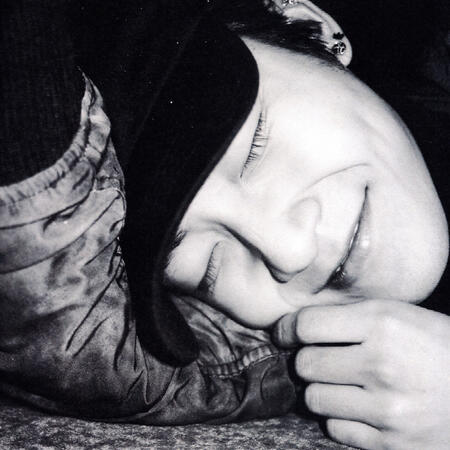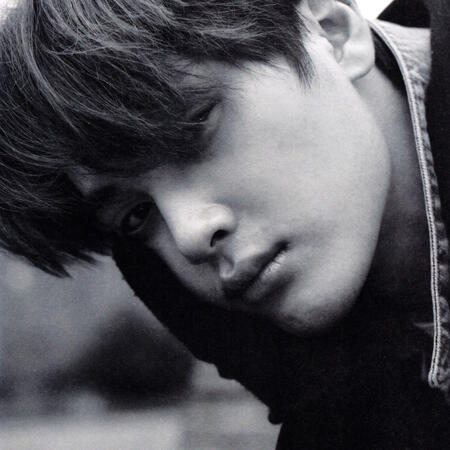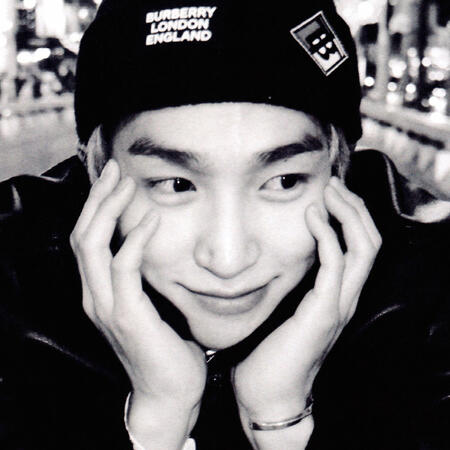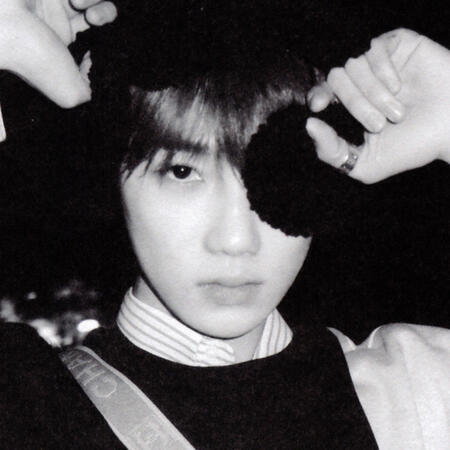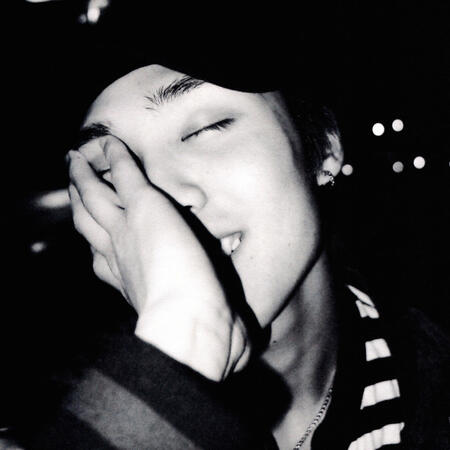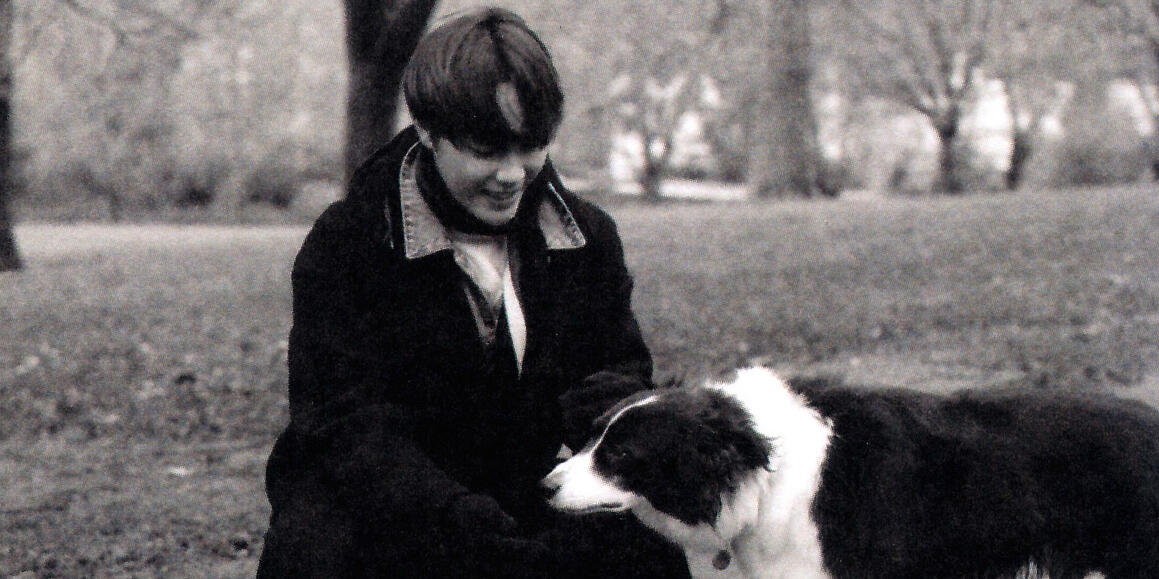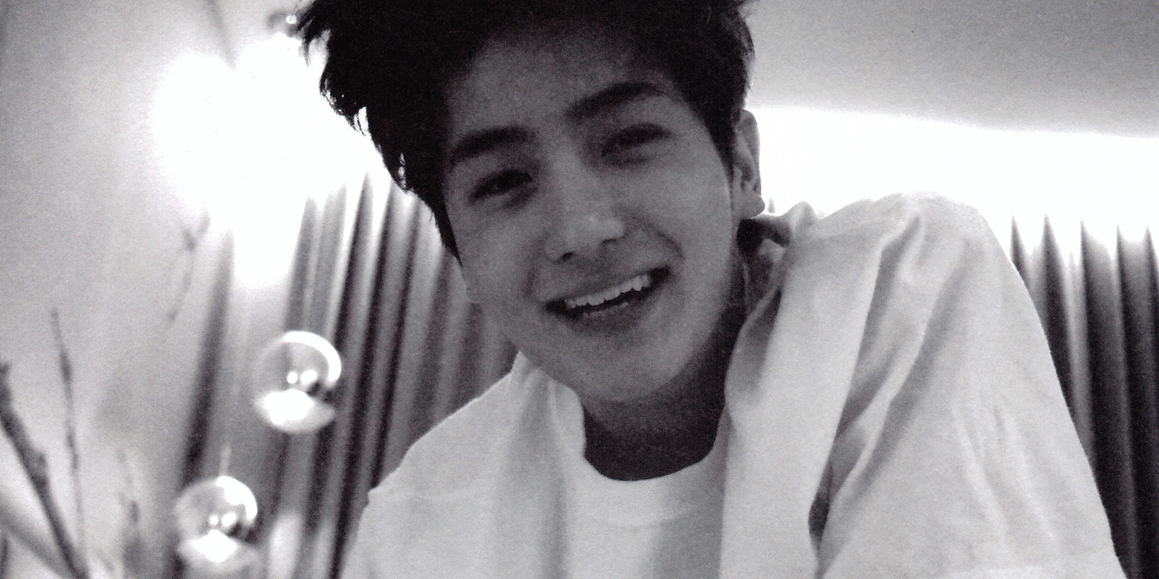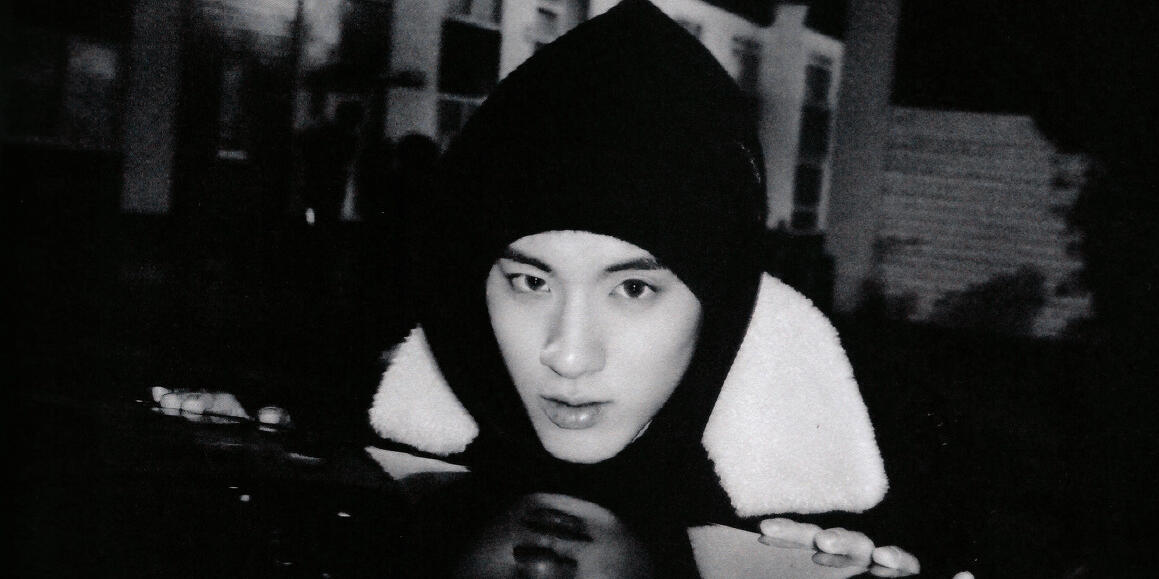scans: hyunjae_gif
ABOUT US
with the increasing popularity of the 16personalities test and the misinformation that surrounds it, there's a lot of wrong mbti types going around. the reason being that tests are highly unreliable and people aren't aware that they should be typed with the help of a professional or someone who knows about jungian cognitive functions.
our intention is to spread correct information about mbti through the kpop group the boyz. there were four people of different mbti types (who stan different members) involved in this process, and we have to thank @typingkpop for being the first one to correctly type the group two years ago.
we have been studying cognitive functions and stanning the boyz for a long time now, and we wouldn't have done all of this if we weren't completely sure of what we are talking about. all of the things we say can be sourced back to variety shows, vlives, interviews, fansign slots, fancafe letters, identity films, and such, and we will be pleased to do so if necessary!
since it's not our main focus, we won't be explaining enneagram in depth. we will still add short descriptions, so you can understand some of the differences between members of the same type and similarities between members of different types.
we will do our best to source all our theoretical basis, so you can have a complete understanding of the topic. enjoy and feel free to ask any questions in our cc! we'll be glad to explain our logic, but make sure you have read all of the information we wrote down first.
sunwoo
intj 5w4
dominant Ni
Ni doms focus on the future and intuitively know what needs to be done before it may even become a real issue. they spend a lot of time thinking about future possibilities, such as their goals and aspirations. they have visions of how things should ultimately be, and see all the possibilities for how a particular situation will play out. they utilize the patterns they have subconsciously stored away to navigate their future and make it what they desire or avoid what they fear.
INTJs have a very deep internal world, and their version of reality can differ from most people’s. their imagination lets them come up with completely novel ideas, because they aren’t tied to thinking about things in terms of normal limits. their thoughts are very abstract, often presenting themselves as images, symbols, or patterns. they’re usually more interested in finding the underlying meaning behind things, rather than taking them at face value.
sunwoo has stated that he isn’t good with words unless he uses some kind of symbolism or situation to express himself, and he feels more comfortable doing so through writing. Ni doms tend to be more at ease communicating through a form of expression where they are able to explore the full depth of an idea and expand on it before presenting it to public scrutiny.
they show a very linear way of speaking, they present their conclusion before their argument, but will gladly walk you through their logic if necessary. they can easily stick to the same topic of conversation for a long time and dive deep into it.
contrary to Si users, they probably won’t be extremely detail oriented. they also tend to be forgetful, because they only store information as impressions and will filter through what’s important to them and useful to accomplish their goals or visions for the future.
auxiliary Te
Te makes INTJs quick to action and efficient. they make logical, objective decisions. they view everything with a critical, unbiased eye and are able to quickly identify problems that need to be solved. they like to give structure to the world around them by giving orders, suggestions, or delegating work since they might think it’s more efficient for someone else to do a task for them if they might get it done faster and better.
sunwoo is very methodical and dedicated when it comes to his work and things he’s passionate about. once he sets a goal for his career, he comes through with it. INTJs like to do things with excellence when they’re working on something they care about, being extremely responsible and determined. but when it’s something they don’t care about, they might become apathetic about the way the job is done.
INTJs show strong confidence in themselves and their capabilities. they like challenges, and want to complete one after the other. they find routine irritating, and only feel fulfilled if they are able to successively solve bigger and better problems.
INTJs tend to talk through their thoughts, or at least externalize them in any other way. they are prone to extensive monologues, providing whatever backstory and illustrations are required for its explication. the thoughts in their head exist in a very abstract form, and this helps solidify them.
their internal world has a certain intensity that they feel is lost when brought up in verbal communication, so if they perceive that the other person has yet to fully understand or agree with them, they aren’t opposed to rehashing things until they are confident everyone is on the same page.
tertiary Fi
sunwoo often takes pride in just being himself, and Fi is concerned with authenticity. this function backs up INTJs’ confidence, giving them a strong sense of self. they might want to follow a career that’s true to themselves, their interests and passions so they can truly be happy.
INTJs might seem like they aren’t emotionally expressive, but when they do open up and get emotional, you know it’s because they’re talking about something that truly matters to them deeply. over time, they might become more compassionate, and more concerned with understanding themselves. they might take up an interest in forms of artistic expression that mirror some of their internal emotions.
underneath the surface, they will hold very strong personal values that they adhere to at all times. they might feel strong loyalty towards people close to them, and have the potential to be highly empathic and easily put themselves in other people’s shoes to understand how they feel or their perspective.
inferior Se
Se will make INTJs sensitive to their environment, subconsciously collecting sensory cues to create Ni impressions, including subtleties that other people tend to miss. too much time being forced to engage with the real world can get exhausting for them. finding ways to minimize this drain is a good way to allow them to focus their creative abilities on the things they are best at.
socially speaking, they might like to bond with people over shared activities, showing a playful side and a witty sense of humor that relies heavily on physicality and expressions. Se might manifest as an indulgence in sensory pleasures (such as eating fast food or… throwing face masks at the wall).
Se will aid them to be quick to action, but it can also make them slightly impulsive. INTJs might enjoy some hands-on or action oriented activities (like playing soccer, dancing, playing an instrument, or working on music).
enneagram 5w4 sx/so
the 5’s basic fear is being useless, helpless, or incapable, and their basic desire is to be capable and competent. for this reason, they look to gain new knowledge and skills to feel like they’re able to compete and defend themselves from the threats of the world. for their own security and self-esteem, 5s need to have at least one area in which they have a degree of expertise that will allow them to feel capable and connected with the world.
the 4 wing adds on to their introspection, it pushes them towards wanting to understand themselves and their motivations. they are acutely aware of their personal differences and deficiencies in comparison to others. they're more emotionally sensitive and expressive, and they might want to show this side of themselves in the arts (like music or writing).
sx/so 5s are more romantic, emotional, passionate, intense, and out-there. they’re on the lookout for people or things that they can connect deeply with, and strive for trust and intimacy with another person. they look for a high ideal in the realm of love and have a vibrant internal life that is highly romantic. this inner world is filled with ideation and fantasies about finding unconditional love.
the intensity, aggression, and counterphobic stance of the sexual instinct combines with the social instinct, resulting in a very charged personality. they can become very accomplished if they can form healthy intimate connections with others who help ground them. social second might make them carry themselves socially with ease, looking to share what they have learned with others. since they’re sp blind, their main weakness will be taking care of themselves and practical matters.
generation z / arena homme
sources: 1 2 3 4 5 6 7 8 9 10 11 12 13
chanhee
intj 9w8
dominant Ni
Ni doms focus on the future and intuitively know what needs to be done before it may even become a real issue. they spend a lot of time thinking about future possibilities, such as their goals and aspirations. they have visions of how things should ultimately be, and see all the possibilities for how a particular situation will play out. they utilize the patterns they have subconsciously stored away to navigate their future and make it what they desire or avoid what they fear. this function is what makes chanhee extremely quick-witted, and capable of easily analyzing situations to decide how to act through Te.
INTJs have a very deep internal world, and their version of reality can differ from most people’s. their imagination lets them come up with completely novel ideas, because they aren’t tied to thinking about things in terms of normal limits. their thoughts are very abstract, often presenting themselves as images, symbols, or patterns. they’re usually more interested in finding the underlying meaning behind things, rather than taking them at face value. Ni doms often report a strong visual element to this function (in the same manner that chanhee does abacus calculations, for example).
they show a very linear way of speaking. they present their conclusion before their argument, but will gladly walk you through their logic if necessary. they can easily stick to the same topic of conversation for a long time and dive deep into it. they tend to be more at ease communicating through some form of expression where they are able to explore the full depth of an idea and expand on it before presenting it to public scrutiny.
contrary to Si users, they probably won’t be extremely detail oriented. they also tend to be forgetful, because they only store information as impressions and will filter through what’s important to them and useful to accomplish their goals or visions for the future.
auxiliary Te
Te makes chanhee a surprisingly authoritative person who likes being in charge in situations he’s confident in. INTJs make logical, objective decisions. they view everything with a critical, unbiased eye, and are able to quickly identify problems that need to be solved. they like to give structure to the world around them by giving orders, suggestions, or delegating work, since they might think it’s more efficient for someone else to do a task for them if they might get it done faster and better.
Te users take the objective logic and facts that they have learned and apply it to their external world, and the external world of those around them. INTJs will use their Te to organize and solve problems and understand complex theories and strategies. they like challenges, and want to complete one after the other. they find routine irritating, and only feel fulfilled if they are able to successively solve bigger and better problems.
Te is what can make INTJs have a blunt, direct way of speaking. they often say things as they are, and won’t sugarcoat them. the thoughts in their head exist in a very abstract form, and this function helps solidify them. their internal world has a certain intensity that they feel is lost when brought up in verbal communication, so if they perceive that the other person has yet to fully understand or agree with them, they aren’t opposed to rehashing things until they are confident everyone is on the same page.
in casual conversation, they might be tempted to correct a mistake another person made, or point out when they think they’re saying something stupid. even though it might come off as harsh, it generally comes from a place of genuinely caring.
tertiary Fi
Fi is concerned with being authentic at all times. it will give INTJs a strong sense of self and security in their opinions, beliefs and tastes. they don’t care about being accommodating, and prefer to speak their mind. underneath it all, INTJs hold strong personal values that they adhere to at all times. this might be especially noticeable when a line they established has been crossed, for which they can become slightly moody or reactive.
INTJs can be highly sensitive people who are very loyal and caring towards people close to them. they might seem like they aren’t emotionally expressive, but when they do open up and get emotional, you know it’s because they’re talking about something that truly matters to them deeply. over time, they might become more compassionate, and more concerned with understanding themselves. they might take up an interest in forms of artistic expression that mirror some of their internal emotions.
inferior Se
Se will make INTJs sensitive to their environment, subconsciously collecting sensory cues to create Ni impressions, including subtleties that others tend to miss. too much time being forced to engage with the real world can get exhausting for them. finding ways to minimize this drain is a good way to allow them to focus on the things they are best at.
it can also evoke an interest in some hands-on activities (like cooking or doing crafts). socially speaking, they might like to bond with people over shared activities, showing a playful side and a witty sense of humor that relies on physicality and expressions.
this function might present itself as an indulgence in sensory pleasures (such as overspending or having too much of a food or drink they like, like coffee). it can also give INTJs an interest in aesthetics or a strong sense of style, along with a tendency to take care about how they present themselves.
enneagram 9w8 sp/sx
the 9’s basic fear is loss and separation, and their basic desire is to have inner stability or 'peace of mind'. for this reason, they want to create harmony in their environment, avoid conflicts and tension, and resist whatever would upset or disturb them. they want internal and external peace for themselves and people around them.
the 8 wing adds a more take-charge orientation, exhibiting a solidity and forcefulness while still maintaining a desire to hear others’ opinions. this wing helps 9s assert their own points of view and make fast and clear decisions, even in the face of strong opposition.
sp/sx 9s are self-effacing but assertive at the same time. they tend to be practical, intuitive, and stubborn. they’re highly aware of the boundaries between themselves and others, and might get frustrated when they feel those boundaries have been violated.
self-preservation 9s put a lot of importance on their comfort. they find satisfaction in activities such as eating, reading, sleeping, or anything that might make them feel comfortable and give them a sense of structure. they’re also more concerned with self-preservation matters like health, housing, savings, etc.
the sexual instinct second gives them some sweetness and the necessity to blend with other people in the way of one-on-one interactions, as well as giving them a sense of melancholy. since they’re so blind, their weakest point will be carrying themselves in groups.
younghoon
infp 4w5
dominant Fi
Fi is intrapersonal. it involves a relationship with oneself, with one’s own emotions, tastes, and values. as sensitive as they might be, Fi doms probably won't be emotionally expressive in public, since they're processing their feelings internally. even though INFPs might look cold or emotionless to other people, they’re constantly analyzing their feelings, reevaluating their stances, and seeking to discover their true self so they can navigate life through their internal value system.
it may be very important for INFPs to only portray their 'true' idealized self to others, they value uniqueness in themselves and other people. they put much more emphasis on finding their true purpose and, even if they become successful, it will not bring them true fulfillment unless it was doing the thing they know they were destined to do.
they are very concerned with the depth and nuances of their values and spend a large amount of their mental space clarifying, sifting, and refining their beliefs. an Fi user’s moral code comes from what their conscience tells them is right, generally treating others the way they themselves want to be treated, for which they can be very compassionate.
it’s common for them to feel a desire for harmony, because feelings and values are considered first, but they will put aside that need to uphold harmony in situations where their internal value system is threatened.
INFPs tend to have an active imagination well into adulthood. they are concerned with the story behind things, and automatically look for meaning everywhere and assign meaning to everything. they look to understand how the meaning of something relates to everything else and can become incredibly captivated by the right idea or story.
auxiliary Ne
INFPs are imaginative and creative people. they cherish the time they spend inside of their rich thoughts and inner worlds. they like to entertain every possible (or impossible) idea in the world, mostly lined up with their Fi ideals. they can be oblivious to sensory things other types may consider obvious, causing them to appear naive, dreamy, or absent minded.
one of the benefits of Ne is it helps INFPs remain open minded. it allows them to see truth on both sides of an issue without forming premature conclusions. they can be good listeners and well-suited to act as fair and effective arbiters, but it can sometimes hamper their productivity and follow-through.
Ne is naturally a very talkative function because it enjoys entertaining ideas and calling out patterns in the real world. once INFPs start getting comfortable with people, they will have a lot to say. they’re constantly having ideas and connecting them together, and look to exteriorize them to make sense of them. this means the more you get to know an INFP, the more you’ll hear of them. they often make random, off the wall comments, and show a quirky sense of humor full of puns and references.
it’s most common for high Ne users to jump from topic to topic and make seemingly random comments and observations. they’re prone to rabbit trails when telling a story or explaining something, often not finishing a sentence before they get started on the next one.
they might present a lot of different interests. more than achieving excellence in one area in life, they look to learn about multiple topics and try a wide variety of things. the more knowledge they have, the more intricate their connections become.
tertiary Si
Si is what helps INFPs retain and categorize the random information they often talk about. it aids their Ne by comparing their ideas, theories or experiences with detailed impressions of what they have experienced in the past. it gives them some inner organization that helps ground them in reality.
they may find comfort in familiarity and routine. they will enjoy accessing their vivid storehouse of memories and recalling favorite experiences in detail. this function might also lead INFPs to want to cling to childhood traditions since repeating those experiences evoke the fond memories and feelings from their childhood.
inferior Te
inferior Te can make INFPs stubborn when they feel like their Fi is being attacked. they will focus on their values, morals, and internal emotions when making decisions and will struggle with remaining objective or focusing on just the facts involved.
on the other hand, it might push them to feel the need to be more organized and get things done, instead of just fantasizing about possibilities. they will experience it as an urge to find ways to put their dreams into action or to create plans for their goals.
having Te in the inferior spot leads these types to not be so concerned with taking the most efficient route to accomplishing their dreams and goals. they are usually satisfied just so long as they know they are on the path towards them.
enneagram 4w5 so/sx
the 4’s basic fear is that they have no identity or personal significance, and their basic desire is to find themselves and their significance. they are acutely aware of their personal differences and deficiencies in comparison to others. healthy 4s are honest with themselves: they own all of their feelings and can look at their motives, contradictions, and emotional conflicts without denying them. they do not try to rationalize nor hide their states.
the 5 wing makes 4s objective and analytical, to counterpoint their more subjective emotional way of relating to others. they have an increased ability to perceive situations from a less reactive perspective and demonstrate more self-restraint and self-containment.
so/sx 4s gear their energy towards people, presenting a charming and humorous demeanor. they can alternate between being highly sociable and withdrawing. they’re often creative people of many interests, but lack the focus and motivation to accomplish what they would like. this is why they can seem scattered, but healthy connections with other people can help them stay focused.
the tendency to compare themselves to other people is intensified for the social four. they always feel like there’s something they lack, no matter how gifted they might be. even though they appear sweet and friendly in public, they store a lot of emotions inside that they let loose in private. the sexual instinct adds on to that, and gives them a bigger unconscious sense of competitiveness. since they’re sp blind, their main weakness will be taking care of themselves and practical matters.
haknyeon
enfp 7w6
dominant Ne
ENFPs learn about the world through observation and experimentation, and can easily think about things across contexts. they think big, not really looking to make their ideas tangible, but to explore different ideas and how they connect to each other. they gain satisfaction from having multiple interests and learning about a wide variety of topics, so they can use that information to keep fueling their ideas.
they find patterns and underlying principles and come up with multiple different possibilities. they make their Ne connections as they talk, write, or create. since Ne is their priority, they might express their ideas without running them through their internal filter first, which might make them seem like they have their head in the clouds to other people.
ENFPs tend to be genuine and likeable individuals who form connections everywhere they go, and haknyeon is very well known for being a social butterfly. Ne as a dominant function will often make someone very talkative; since its users get their ideas from the world around them, they usually flow best when they have someone to bounce their thoughts off of, so they can get input on whether they’re realistic or not. they often make random, off the wall comments, and show a quirky sense of humor full of puns and references.
one of the benefits of Ne is it helps them remain open-minded and see truth on both sides of an issue without forming premature conclusions, but this can sometimes hamper their productivity and follow-through. leaning too heavily on their Ne can make them chase too many rabbit trails and to lose sight of their original focus.
auxiliary Fi
Fi is intrapersonal. it involves a relationship with oneself, with one’s own emotions, tastes, and values. Fi users emphasize on the need to just be themselves and do the things they want to do. they will probably aim for a career that aligns with their ‘true self’ and their interests.
haknyeon says one of his strengths is his confidence, and secure ENFPs may actually believe themselves to be thinkers because Fi-Te provides them with strong self-assurance. Fi will make ENFPs sure of what they think and their opinions, they’re honest and won’t hesitate to say what they want to say. they are straightforward, but in a way that often comes off as more lighthearted than offensive.
they tend to struggle to read people, and will likely assume the way they feel is also how the other person feels. even though they are very warm and caring to those they are close to, they’re really good at self-care and putting healthy boundaries in place.
Fi users are extremely self-aware and spend a good deal of time on self-reflection. they are very concerned with the depth and nuances of their value system and spend a large amount of their mental space clarifying, sifting, and refining their beliefs. their moral code is derived from what their conscience tells them is right, and they generally treat others the way they want to be treated. strong Fi users will judge their own actions and others against their internal moral code and act accordingly.
they check in regularly to make sure they are living in accordance with these values. as they go through life, ENFPs constantly expand their inner understanding of themselves, evolving and developing a unique set of morals and ethics that is all their own.
tertiary Te
Te allows ENFPs to take in information from the real world, make quick decisions on the most effective solution and put it into play right away. because of their awareness of the external world and their creative thinking, they can pull out their troubleshooting skills when necessary and get a job done effectively. because of their Fi, they can feel comfortable with a decision without being able to articulate a reason at the time.
Te will balance Ne giving ENFPs the push to bring their ideas to life, which can make them come off as very hardworking and dedicated. even though they know it’s not possible, they often feel like they should be masters of whatever they try when they do it the first time.
tertiary Te is also what gives haknyeon strong self assurance, he’s sure of his abilities and his talents and wants to find the best procedures to perfect them and apply them regardless of the limits other people might force on him.
inferior Si
ENFPs value their own experiences very highly, and typically have a good memory or catalogue of details about what they deem important stored away. they tend to relate to the sense of being grounded or anchored inside, although they might appear quite idealistic to others.
inferior Si will help ENFPs nail down one goal for themselves out of all the things they want to do. once Si has been developed more, they can see that in certain circumstances it’s necessary to make a long-term commitment in order to get what they want.
it might also appear as an interest in traditions and a tendency to be nostalgic and sentimental about things that hold deep meaning for them (like haknyeon with his family and home life in jeju). a lot of their basic values have been decided early on, and they often fall back on these until new experiences cause them to reevaluate them.
enneagram 7w6 sp/so
the 7’s basic fear is being deprived and in pain, and their basic desire is to be satisfied and content, to have their needs fulfilled. they want to maintain their freedom and happiness and to keep themselves excited and occupied. they’re enthusiastic about anything that catches their attention, approaching life with curiosity, optimism, and a sense of adventure. they tend to be extremely practical and engaged in a multitude of projects at any given time, and are exhilarated by the rush of ideas and by the pleasure of being spontaneous.
the 6 wing adds the capacity to understand situations as being both half-full and half-empty. these 7s have an increased perceptiveness and an ability to anticipate potential problems, so their actions become more deliberate and less based on their instantaneous reactions.
sp/so 7s have many friends and love to entertain. their energy is focused on comforts of the body and positive experiences. they’re future oriented and enjoy making plans for their future (related to sp concerns like making money, career opportunities, food, etc.), even if they tend to not come to fruition. aside from this, much of their energy is focused on maintaining their connections.
self-preservation 7s are practical and concrete, they have a very strong focus on seeking security and getting what they need or want. they pursue positive stimulating experiences to escape the difficult parts of life, and with the social instinct second they might do so through their friends and social connections. since they’re sx blind, their weakest point will be opening up to others and forming intimate connections with people.
hyunjae
intp 7w8
dominant Ti
Ti relies on its own inner logic and manufactures its own ways of doing things. it’s confident in its ability to spontaneously and independently figure things out, being relatively unconcerned with whether others agree with its methods or conclusions. this makes Ti doms prone to be self-directed and self-taught. they follow their own lead with little need for external aids or prompts, and can engineer hacks or workarounds in nearly any situation.
hyunjae describes himself as an honest and frank person who might come off as blunt to other people, which is characteristically Ti. INTPs pride themselves in their ability to be detached from situations in order to be as objective as possible. because Ti incorporates information from both sides of the brain, they’ll judge situations from every perspective until they come to a conclusion they deem the ‘right’ one. this is why they tend to avoid stating absolutes until they're completely sure about something.
high Ti users are curious and want to make sense out of everything they see and experience to see if it fits in their logical framework of what they already know. they’re constantly reshaping their own perspective on what makes sense to them and will live life through this lens, while disregarding what doesn’t. they’re often the first to point out a flaw or mistake in another person’s logic.
as they have experiences in certain areas and continuously put the pieces together, they gain huge stores of knowledge regarding what interests them. it’s common for INTPs to question what others think to deepen their understanding and get to the heart of matters, even if it’s not something really worth debating. they might like to play devil’s advocate, even against their own ideas. truth is, they’re trying to convince themselves of their arguments as much as the other person.
auxiliary Ne
INTPs are ingenious and creative, looking outside the box for answers and inspiration. auxiliary Ne will help the INTP come up with creative ways to solve issues, although they might not always be practical or realistic. they enjoy theorizing and collecting random information for the sake of it.
one of the benefits of Ne is it helps INTPs remain open minded. it allows them to see truth on both sides of an issue without forming premature conclusions. this makes them good listeners and well-suited to act as fair and effective arbiters, but it can sometimes hamper their productivity and follow-through.
Ne is naturally a very talkative function because it enjoys entertaining ideas and calling out patterns in the real world. once INTPs start getting comfortable with people, they will have a lot to say. they’re constantly having ideas and connecting them together, and look to exteriorize them to make sense of them. this means the more you get to know an INTP, the more you’ll hear of them. they often make random, off the wall comments, and show a quirky sense of humor full of puns and references.
it’s most common for high Ne users to jump from topic to topic and make seemingly random comments and observations. they’re prone to rabbit trails when telling a story or explaining something, often not finishing a sentence before they get started on the next one.
they might present a lot of different interests. more than achieving excellence in one area in life, they look to learn about multiple topics and try a wide variety of things. the more knowledge they have, the more intricate their connections become.
tertiary Si
Si helps INTPs retain and categorize the random information you often hear them talk about. they might at times seem like a well of trivia. this function aids Ne to make connections by bringing up things they already know or have seen, and helps them compare their ideas to what they have stored in their minds.
this might balance out the disregard dominant Ti has for established concepts, rules and structure. they might beat themselves up over past mistakes and want to undo them, or realize there was a flaw in their past logic and attempt to fix it.
they may find comfort in familiarity and routine. they will enjoy accessing their vivid storehouse of memories and recalling favorite experiences in detail. this function might also lead INTPs to want to cling to childhood traditions since repeating those experiences evoke the fond memories and feelings from their childhood.
inferior Fe
inferior Fe makes INTPs not very aware of their own feelings because they focus on the emotions of others. it’s not that they’re unemotional, but they process emotions with delay, and will probably realize how something makes them feel later on.
even though INTPs can be very talkative, they might be shy or reserved in new social situations because they realize that they cannot bring out the situationally-appropriate emotions easily.
Fe gives them a warm and caring side underneath their seemingly cold or distant demeanor, for which they might show they care about people in more low-key, practical ways. they want others to feel included and treated with fairness and respect. this function also balances out Ti’s straightforwardness and makes INTPs aware of when a line has been crossed.
enneagram 7w8 sp/so
the 7’s basic fear is being deprived and in pain, and their basic desire is to be satisfied and content, to have their needs fulfilled. they want to maintain their freedom and happiness and to keep themselves excited and occupied. they’re enthusiastic about anything that catches their attention, approaching life with curiosity, optimism, and a sense of adventure. they tend to be extremely practical and engaged in a multitude of projects at any given time, and are exhilarated by the rush of ideas and by the pleasure of being spontaneous.
an 8 wing tends to make the 7 more direct, assertive, and powerful. they have a more grounded presence and an increased desire to put ideas into action.
sp/so 7s love to entertain and like to experience life with their friends. self-preservation in 7s manifests as a desire for comforts and positive experiences. they like to make plans for the future (surrounding sp worries like money or health), even though many of them don’t come to fruition. with social second, much of their energy will spill towards wanting to maintain their social connections.
self-preservation 7s create webs of connections of people they trust. they’re practical, good at networking, and have an eye for opportunities. they tend to be warm, friendly, and talkative, displaying a light-hearted lack of seriousness. even then, they might be slightly disconnected from their own emotions.
they cultivate a sense of being kind and generous and like to feel like everyone depends on them, which might be intensified with the social instinct second. this can make them seem more people oriented and impulsive, as well as more concerned with the group and doing things for others. since they’re sx blind, their weakest point will be opening up to others and forming intimate connections with people.
generation z / arena homme
sources: 1 2 3 4 5 6 7 8 9 10 11 12
jacob
infj 2w1
dominant Ni
Ni doms focus on the future and intuitively know what needs to be done before it may even become a real issue. as jacob mentioned, they tend to play out scenarios in their head. they spend a lot of time thinking about future possibilities, such as their goals and aspirations. they have visions of how things should ultimately be, seeing all the possibilities for how a particular situation will play out. they utilize the patterns they have subconsciously stored away to navigate their future and make it what they desire or avoid what they fear.
INFJs are fascinated by the intricacies of human interactions. they want to understand and relate to other people. combined with Fe, Ni mainly helps INFJs analyze others and pick up information and patterns so they can figure out what’s best to show or hide, how to act in social situations, or how to react to other people’s emotions.
since their thought process is completely internal, they prefer to figure things out in their head before speaking. they have a highly developed inner world that will generally remain largely private to them. Ni dominants tend to think by way of images rather than words, and their intuitions often manifest as symbols, images, dreams, or patterns.
Ni likes to linger on a single topic of discussion and to dive deep into it, rather than immediately moving on to something else. even though they have a good memory for short term things, they’ll only stick to what is useful for them and release everything else into long term storage or delete it completely. they prefer to invest more of their time and energy into a handful of things they really care about, and tend to develop expertise in a specific discipline (like music).
auxiliary Fe
high Fe users are drawn to people, they seek a positive emotional reaction from others and often are natural caregivers who value social harmony and common courtesy. INFJs make decisions based on what's best for others and worry about how they present themselves. they naturally see patterns in human behavior because their brain is wired to see various perspectives at once and attempt to arrive at one answer. they can always point out the side of the conversation that isn’t being represented, and maybe choose to play devil’s advocate.
INFJs subconsciously pick up how other people feel and mirror their emotions and moods accordingly, which makes them highly sympathetic and adaptable people. regardless of this, jacob has talked about his willingness to be there for others when they need advice, but his struggles to open up himself. INFJs can be very reserved and private, even with people they’re close to. they exert a lot of emotional energy caring about so many people but feel like they struggle to do anything to help them. this external focus also implies that they have a hard time knowing and expressing their own needs and feelings in their interpersonal relationships, preferring to keep them to themselves for the sake of others.
they show an insightful way of helping others, wanting to make those around them feel understood and inspired, and use their dominant intuition to pick up on cues as to what a person is thinking or feeling, making them great counselors and listeners.
they feel like their inner world is more fascinating than the world around them, and they struggle to convey the level of detail that they’re experiencing in their mind. they often lament that they don’t ‘do’ anything and are genuinely confused when people find them interesting.
tertiary Ti
Ti makes INFJs capable of critical analysis and problem solving, and helps Ni doms untangle the INFJ’s impressions. it grounds, narrows down, and makes sense of the thoughts that come to them, utilizing concrete Se facts to steer Ni in a more rational direction.
it might give them a tendency to overthink and overanalyze things, which leads them to be critical of themselves or ‘negative’. they might get caught in this inner thought process and ultimately not act on things, or alternatively want to improve and find ways to become better.
INFJs often enjoy activities that give Ti freedom to explore on it’s own. since they easily absorb other people’s emotions and get very stressed in atmospheres of conflict, Ti is their relief function. they enjoy using it when they’re in a stress free environment and can learn about things they’re interested in or try to understand how things logically connect.
inferior Se
inferior Se can present itself in an interest in hands-on or action oriented activities. small doses of positive Se on a regular basis (like sports, exercising, dancing, working on music, or playing an instrument) can be positive for INFJs to relieve stress. this function might also show as a need to indulge in sensory pleasures, like eating too much of foods they enjoy (like cereal).
Se will give them a push to act on things instead of just staying in their own heads. they might enjoy socializing with people through shared activities, and their humor can often rely on physicality and expressions.
problems with Se arise when they’re not getting enough alone time, when their outer environment isn’t peaceful and secure, when the Se stimulus they’re getting is stressful, or when they’re required to use their Se in intense way or prolonged periods of time.
enneagram 2w1 sp/so
the 2’s basic fear is being unwanted or unworthy of being loved, and their basic desire is to feel loved. when healthy, this type has the potential to be one of the most loving, helpful, generous, and considerate. going out of their way for others makes them feel that theirs is the richest, most meaningful way to live, which is why people are drawn to them. they enliven others with their appreciation and attention, helping people to see positive qualities in themselves that they had not previously recognized.
with a 1 wing, they balance their focus on people with a dedication to task, are more discerning about situations and people, pay more attention to detail, and have an increased ability to be firm and less accommodating, with far less worry about how others will react to them when they assert themselves.
self-preservation 2s often have a very cute and child-like demeanor. they attract people by just being naturally loveable, seemingly deserving of affection. they inspire people to like them and take care of them. they’re stuck between wanting to live up to that youthful image and wanting to take care of themselves. they’re tender and sweet, but more guarded and reserved than other 2s.
the social instinct second makes them drawn to groups, and gives them some balance to become more assertive aside of the image they present. it comes naturally to them to be helpful towards others, although over time they’ll grow to want that energy back for them. since they’re sx blind, their weakest point will be opening up to others and forming intimate connections with people.
sangyeon
estj 1w2
dominant Te
sangyeon is determined and methodical, and won’t give up until he gets something done properly. ESTJs are highly confident and efficient problem solvers with the ability to figure out the best course of action for the best outcome. they’re natural born leaders who easily see what everyone should be doing to accomplish a task at hand.
they look to exert control over their environment and the people that surround them, so they can shape the external world the way they think it should be. they are quick to make judgements and want to move forward, with no interest in wasting time nitpicking a solution before applying it.
they value external logic and will want to see solid proof and evidence to back up a statement. although ESTJs are highly sociable people, they aren’t scared of expressing their opinions nor shy away from necessary confrontation, showing a pragmatic, straightforward, and matter-of-fact way of speaking.
for all of these reasons, ESTJs can be stereotyped as harsh and critical, but a balanced ESTJ will probably just come across as an amiable human being in daily interactions. the people around them can count on them to be honest, reliable, and true to their word. they will hold themselves to the same high standards they expect of other people, so their loved ones can expect them to be responsible, loyal, and trustworthy.
when it comes to personal conflict, they will want to resolve issues quickly and move on. they can be proponents of tough love, giving orders and establishing rules and structure because they care about the people around them.
auxiliary Si
Si users subconsciously pick up what their five senses are experiencing. instead of feeling like they’re experiencing it real time, these things will be stored away so they can reference them in the future. ESTJs learn straightforward, practical systems, rules, and strategies with ease and grace. because of their naturally linear thought patterns, they can easily map out the details of what needs to happen to make an idea a reality and see all the steps needed to bring a project to completion.
they look for the most reliable or well established method of solving or approaching a situation. when coming up with the quickest way to get something done, Si will bring up the way it was effectively done in the past. they want to know what to expect to plan accordingly. since they're detail oriented, they can at times prefer taking over tasks themselves rather than delegating them to others, so it’s highly important to them that the people in their lives are dependable.
ESTJs feel very concrete internally. they are sure of themselves, their views, and their morals. they see the external world as a world of possibilities that can change at any moment, while they are very solid on the inside. they can recall with vivid detail exactly how a situation played out before and swiftly recall facts and details that will be important in the future.
Si is also associated with remembering and preserving past ways of doing things. they can become traditional and ritualistic in their everyday behavior. they appreciate things which are routinary and familiar; if they find positive experiences that work for them, they’ll want to continue having them.
tertiary Ne
tertiary Ne presents ESTJs with possible new solutions when their Si fails them. this is the part of the ESTJ that explores possibilities and stops Si from getting too bogged down in the details. they might look at a complex situation or problem and see multiple logical solutions and outcomes, but know it’s only possible if they take a specific set of steps.
even though they will still want to focus on ideas and possibilities one at a time, they might find brainstorming stimulating and use it to find clever connections between things to create unusual projects. they can present a creative streak that they indulge in for fun (like making music or doing photography).
they might show a surprisingly random or quirky sense of humor and, regardless of having an orderly speech pattern, they can easily jump from topic to topic and repeat themselves multiple times to refine their ideas.
inferior Fi
Fi backs up their confidence and their firm opinions and beliefs, and tests new information against their internal moral system to see if it fits. it can influence their decisions, since they may seek to find tangible way to work their goals alongside their values. they can make advancements in areas that others might be afraid to venture into, because they aren’t worried about what others think.
if Fi is developed, an ESTJ can learn to soften their Te, gain a strong sense of identity, and gain a deep capacity for empathy. Fi is the small part of the ESTJ that is quite vulnerable and sensitive. while others might view them as very blunt, outspoken people, inside they do have a soft heart. they can care deeply and like to show their love in more practical ways, operating by the ‘golden rule’ of treating others how they would like to be treated.
enneagram 1w2 so/sp
the 1’s basic fear is being being corrupt, evil, or defective. their basic desire is to be good, to have integrity, to be balanced. they stay true to their principles and have a strong self of purpose. they have a 'sense of mission' that leads them to want to improve the world in various ways, using whatever degree of influence they have. they are people of practical action and wish to be useful in the best sense of the word, trying their best to reduce the disorder they see in their environment.
when 1s have a 2 wing, they are more consistently generous and people-focused, in addition to being more gregarious and displaying more consistent warmth to others.
so/sp 1s are satisfied when others follow their rules or hold up to their standards of justice, and might get frustrated when they don’t. they're community minded and offer their help to others. they want to convey that they can be trusted and have everyone's best interest in mind. they rigidly adhere to particular ways of doing things, and look to be the perfect example for others through their actions. they have an unconscious need to be the bigger person and show they’re right and others are wrong. they learn to repress emotions from a young age, and probably always acted ‘older’ than they were.
the self-preservation instinct second makes them warmer and gentler, showing genuinely good intentions. they have a tendency to be perfectionistic and plan everything out, but the fear of imperfection presents itself in relation to other people. since they’re sx blind, their weakest point will be opening up to others and forming intimate connections with people.
juyeon
istp 9w1
dominant Ti
Ti relies on its own inner logic and manufactures its own ways of doing things. it’s confident in its ability to spontaneously and independently figure things out, being relatively unconcerned with whether others agree with its methods or conclusions. this makes Ti doms prone to be self-directed and self-taught. they follow their own lead with little need for external aids or prompts, and can engineer hacks or workarounds in nearly any situation.
high Ti users are curious and want to make sense out of everything they see and experience to see if it fits in their logical framework of what they already know. they’re constantly reshaping their own perspective on what makes sense to them and will live life through this lens, while disregarding what doesn’t. they tend to be the first to point out a flaw or mistake in another person’s logic.
as they have experiences in certain areas and continuously put the pieces together, they gain huge stores of knowledge regarding what interests them. since much of the ISTP’s analysis is performed in their subconscious, it can be very tricky for them to eloquently describe their logic, making it hard for others to see their point. they struggle to form conclusions and avoid stating absolutes until they’ve had time to mull things over in their heads.
regardless of this, ISTPs are some of the most practically intelligent of all the personality types. they are known for being good with their hands, calm in a crisis, and excellent at solving problems as they arise. they can be interested in the theoretical, but they will look to apply their logical model to more tangible things, such as knowing which muscles to train for different dancing moves or how to control their body accordingly.
auxiliary Se
high Se users constantly need to be doing something, and actively look for thrilling physical activities or to do things with their bodies (like dancing, exercising, sports, or even extreme sports). they’re highly sensitive to and aware of their surroundings, taking in the information the five senses are telling them real time.
Se prefers to learn from personal experience and hands-on training. ISTPs show high kinesthetic intelligence and don’t only like learning for the sake of learning, but to do something practical and tangible with it. this doesn’t only mean physical things, but it can also mean learning something they can put to use in the real world (like a new language). they might also prefer to teach people by walking them through the process and showing them how to do things rather than just explaining it.
juyeon says he feels alive when he does new things and goes to new places. Se users enjoy and are always open to trying new experiences. for example, they could enjoy traveling and taking in everything about the country’s culture, or trying some fun new activity.
in social situations, they prefer to bond through shared activities, or to do something with another person rather than just getting together to talk. in a similar manner, their humor tends to rely a lot on physicality and expressions.
ISTPs love achieving mastery and they want to feel like they can produce something excellent time after time. they might show an interest in beauty or aesthetics. when they see something that’s been done with beauty and excellence, their Ni gives them hints at why it’s beautiful and what makes it well-crafted, which they use in turn to make things with a high level of quality.
tertiary Ni
tertiary Ni helps Ti balance out their Se and stop ISTPs from making impulsive decisions. it gives them a vision of how they ultimately want something to be. they won’t be as forward thinking as someone with higher Ni, but it’ll allow them to foresee how events might play out or picture where they want to get in life and how to get there. they’ll show a desire to perfect their pre-existing talents or skills to achieve this.
Ni presents itself in a surprisingly abstract and symbolic way of thinking, and an interest in analyzing and interpreting their interests. imagery and archetypes can be fascinating to them, and they might be philosophical and interested in theoretical and abstract possibilities.
inferior Fe
inferior Fe will be more focused on other people’s feelings, so ISTPs will struggle to figure out how they feel about something or separate themselves from the people that surround them. they might feel like what they present to others is different from how they truly are. they can show complications when it comes to reading other people’s intentions, because of how low this function is in their stack.
ISTPs might want things to be harmonious and prefer to get along with others, they have an awareness and desire to treat everyone with fairness and respect. they often show they care about other people in low-key, practical ways. they can usually navigate social situations relatively smoothly, maintaining an outer ‘cool’ demeanor.
enneagram 9w1 sp/so
the 9’s basic fear is loss and separation, and their basic desire is to have inner stability or 'peace of mind'. for this reason, they want to create harmony in their environment and avoid conflicts and tension and resist whatever would upset or disturb them. they want internal and external peace for themselves and people around them.
the 1 wing adds attentiveness and perfectionism. they might pay more attention to details or be more precise. even though 9s often want to diffuse their attention, a 1 wing increases their focus, acuity, clarity, and discernment.
the sp/so subtype is the most self-effacing of the 9s, and the less assertive. their communication style is short, concise, and non confrontational. they can get frustrated because they can’t express what they truly want to say, but they can show great eloquence when they get the chance to express themselves.
self-preservation 9s look for a sense of comfort through the satisfaction of physical needs and look for activities (such as physical fitness or reading) to put their attention into to avoid being connected to their own ‘being’.
the balance of the social instinct often makes them put the groups’ needs above theirs when necessary, and they might question their sense of self because much of their identity comes from trying to belong. since they’re sx blind, their weakest point will be opening up to others and forming intimate connections with people.
generation z / arena homme
sources: 1 2 3 4 5 6 7 8 9 10 11 12 13
changmin
enfj 7w6
dominant Fe
Fe is about focusing on the needs of others and recognizing the needs of the group. healthy ENFJs tend to be friendly, charismatic, and natural caregivers who want to evoke positive emotions in other people. they read the vibes of everyone in the room and are constantly aware of what everyone seems to be thinking and feeling. they will build on the impression they get from people’s feelings and mirror it back to them using their own mannerisms, expressions, emotions, and capabilities to influence and help them.
Fe dominant types look to put order to their external social environment. they believe what’s best for other people or the group, and will strive to achieve that. they are looking to create a bond of shared feeling, especially ‘good’ feeling.
changmin thinks that if you’re too honest you can cause damage to other people, and Fe doms tend to hide a lot from others to avoid ruining the atmosphere. ENFJs have a tendency to keep negative or personal feelings to themselves, they have trouble opening up and might avoid expressing what they think if it means they might make others uncomfortable. this doesn’t mean they don’t have thoughts or opinions, but they’ll watch themselves when they share them.
Fe users tend to avoid conflict, but they might react when people don't ‘conform’ to societal norms or the norms of the group. they may be prone to telling others what they should or should not do or to try to get a group of people on the same page, since they believe they know what’s best for everyone involved.
auxiliary Ni
Ni aux helps ENFJs quickly get a sense of people and their surroundings due to their subconscious Ni analysis and conscious Fe observations, often jumping to rather accurate conclusions about a person or situation without fully understanding why. it translates events into patterns, symbols, life lessons, and meaning, and uses them to navigate the future.
they tend to quickly pick up feelings from other people, but might pick up an emotion from someone without noticing and wonder why they are feeling so differently all of a sudden. the more experience they have with people, the better they’ll become at understanding them and their needs, and the easier it’ll be to differentiate their feelings from the feelings of others.
ENFJs focus on the future and intuitively know what needs to be done before it may even become a real issue. they spend a lot of time thinking about future possibilities such as their goals and aspirations. they have visions of how things should ultimately be, striving to take the best path towards an ideal outcome.
they can show abstract and conceptual thinking and will attach symbolic meaning to certain objects or people. they're very expressive and often utilize metaphors in their speech. they might be prone to discussing abstract or existential ideas. they also present a linear way of speaking, preferring to dive deeper into a topic instead of jumping from one to the other.
they have a rich, layered inner world that they often ‘mask’ from other people. they might be drawn to unusual interests or concepts because they aren’t tied to thinking about things in terms of normal limits. even if something appears to be weird but unique, the ENFJ will most likely pursue it. people will start seeing this side of them once they get to know them better and they put down their walls of ‘normal’, socially expected behaviors.
tertiary Se
Se will make ENFJs sensitive to their environment, subconsciously collecting sensory cues to create Ni impressions, including subtleties that other personality types tend to miss. this function also works as the driving force for ENFJs to make their Ni visions a reality. it can be helpful for them to write out their goals so they can have a physical reminder of their priorities.
tertiary Se users can seem energetic and show an interest in physical or hands-on activities (such as dancing, cooking, drawing, or doing crafts). they show an ease to explain or express things with their bodies. they might enjoy socializing with people through shared activities, and their humor can often rely on physicality and expressions.
this function might also make ENFJs concerned with presentation or how they can visually impress other people, and they can also have an interest in aesthetics, which they show in their fashion or in wanting to have a nicely decorated living space.
inferior Ti
inferior Ti might present itself in an overanalysis of things. ENFJs have a tendency to tear apart what they know and analyze it to a pulp. they can become uncharacteristically critical of themselves, finding flawed logical reasons to blame themselves for any failure. they can also be highly indecisive, because they want to weigh their options before moving forward.
on the other hand, this function helps them make objective, impersonal decisions and balance out the Fe need to please others. underneath their socially accommodating surface, they will judge the things that make or don’t make sense to them, but won’t be as strict about it as someone with higher Ti. for this reason, they might cling to things that make sense to them regardless of facts that clearly contradict them.
enneagram 7w6 so/sp
the 7’s basic fear is being deprived and in pain, and their basic desire is to be satisfied and content, to have their needs fulfilled. they want to maintain their freedom and happiness and to keep themselves excited and occupied. they’re enthusiastic about anything that catches their attention, approaching life with curiosity, optimism, and a sense of adventure. they tend to be extremely practical and engaged in a multitude of projects at any given time, and are exhilarated by the rush of ideas and by the pleasure of being spontaneous.
the 6 wing adds the capacity to understand situations as being both half-full and half-empty. these 7s have an increased perceptiveness and an ability to anticipate potential problems, so their actions become more deliberate and less based on their instantaneous reactions.
so/sp 7s are more concerned with self image and relation to the group, which can give them feelings of insecurity and anxiety. they avoid their own self-interest and tend to give others more. they are drawn to alleviate others’ pain, because helping other people can be a way for them to project their pain somewhere outside themselves. they express excessive enthusiasm about their visions and may have fantasies of a perfect future.
even though they’re humorous and comfortable dealing with groups and surface social relations, the self-preservation instinct balances this with follow-through in their work. they’re more practical, calculating, and dependable, but they can be surprisingly guarded from others. since they’re sx blind, their weakest point will be opening up to others and forming intimate connections with people.
eric
estp 7w8
dominant Se
in a characteristically Se fashion, eric is a very energetic, loud and playful person. Se is all about kinesthetic intelligence and five senses experiences, so working with their body and hands is very gratifying for them. ESTPs have a hands-on approach, preferring to figure things as they go.
they constantly feel the need to act or do something, and consistently strive for sensory experiences. they’re prone to hands-on or action oriented hobbies (like wide variety of sports, including extreme sports, dancing, or even cleaning) or pseudo physical hobbies (like playing video games or watching action movies). they might also enjoy strategy centered games or puzzles which utilize their Ti (such as rubik’s cubes).
they can get bored very easily if they’re engaged in activities that are repetitive or don’t require them to use their bodies. they feel that every moment would be best spent on something worthwhile and fun. for this reason, Se might also present itself in the need to indulge in sensory pleasures, like eating too much of a food they enjoy (like ramen).
they tend to 'go with the flow'; they often act on their impulses or what they want to do in a specific moment. since they’re fully present in the moment, the current situation they find themselves in feels like it’s their whole world. this is why Se doms prefer to act on things rather than just talk or think about them, and they can’t stand sitting on an idea once they set their mind on it.
ESTPs are highly observant and in tune with their environment. Se makes them value beauty. their strong awareness of the external world might push them to seek out beautiful and serene surroundings.
auxiliary Ti
ESTPs may seem constantly active and adventure-seeking, but internally they’re usually self-disciplined, realistic and practical. since they introvert their thinking, they keep a lot of their judgments and decision-making processes internalized, giving them their famed easy-going demeanor. because of Ti, they can analyze nearly any situation, diagnose the problem, and determine how to fix it, and they are quick to grasp underlying principles and logical concepts.
Ti relies on its own inner logic and manufactures its own ways of doing things. it’s confident in its ability to spontaneously and independently figure things out, being relatively unconcerned with whether others agree with its methods or conclusions. high Ti users follow their own lead with little need for external aids or prompts and can engineer hacks or workarounds in nearly any situation.
high Ti users are curious and want to make sense out of everything they see and experience to see if it fits in their logical framework of what they already know. they’re constantly reshaping their own perspective on what makes sense to them and will live life through this lens, while disregarding what doesn’t. they’re often the first to point out a flaw or mistake in another person’s logic.
as they have experiences in certain areas and continuously put the pieces together, they gain huge stores of knowledge regarding what interests them. ESTPs will use this to judge their own ideas and goals and gauge whether these things are practical and worth pursuing.
tertiary Fe
Fe is what makes eric come off as highly friendly and charismatic. ESTPs use this function to navigate through social settings and form connections with others. they are usually very good at blending in and engaging with other people, quickly establishing rapport with them. socializing and making new friends comes very easily to them.
because of this function, they tend to focus more on other people rather than themselves, and they can worry about how they come off to others and how they perceive them. if this function is developed, they can be very socially aware and skilled at making other people feel comfortable, and they might intuitively know how other people are feeling and how to make them feel better. they tend to feel responsible for the needs and emotions of others and can become very protective of their loved ones.
inferior Ni
ESTPs might enjoy thinking about the future vaguely, but have the sense that focusing too much on what might be is pointless. they often think that if they focus on what is going on currently and adapt to things as they come up, the future is automatically going to be taken care of. their intuition is subconscious, so they are always calculating for the future even if they aren’t aware of it.
Ni balances Se by providing ESTPs an awareness of what knowledge will be of use to them in the long term, rather than in the moment. it might also give them a gut feeling of something that’s going to happen.
much of their analysis is subconscious. their intuitive side looks to understand things more deeply, but putting language to their abstract thought process requires a lot of effort, because they don’t naturally think in a completely linear fashion.
enneagram 7w8 so/sx
the 7’s basic fear is being deprived and in pain, and their basic desire is to be satisfied and content, to have their needs fulfilled. they want to maintain their freedom and happiness and to keep themselves excited and occupied. they’re enthusiastic about anything that catches their attention, approaching life with curiosity, optimism, and a sense of adventure. they tend to be extremely practical and engaged in a multitude of projects at any given time, and are exhilarated by the rush of ideas and by the pleasure of being spontaneous.
an 8 wing tends to make the 7 more direct, assertive, and powerful. they have a more grounded presence and an increased desire to put ideas into action.
the 7 so/sx subtype has a lot of energy, almost frenetic. they show a great sense of humor and want to keep things light. they cultivate many friendships and have no trouble winning people over, but other people might feel drained interacting with this subtype because they're 'on' so much of the time.
social 7s avoid being excessive and opportunistic. in their efforts of working against the 7’s self-interest, they can be too pure and might give others more than what they take for themselves. they like being supportive of others so they don’t focus on their own pain.
the sexual instinct gives them more optimism, enthusiasm, and allows them to focus on the positive aspects of a situation in an unconscious desire to avoid the painful or boring parts of life. since they’re sp blind, their main weakness will be taking care of themselves and practical matters.
kevin
isfp 4w3
dominant Fi
in a high Fi fashion, kevin says that he thinks of himself as an open book, and that he doesn’t think there’s a side of him that people don’t know about. ISFPs spend a lot of time on self-reflection. they look to only portray their 'true' idealized self to others and value uniqueness and staying true to themselves. they might look to stand out from the crowd or express their individuality in the things they’re passionate about. they put much more emphasis on finding their true purpose and, even if they become successful, it will not bring them true fulfillment unless it was doing the thing they know they were destined to do.
they are very concerned with the depth and nuances of their values and spend a large amount of their mental space clarifying, sifting, and refining their beliefs. an Fi user’s moral code comes from what their conscience tells them is right, generally treating others the way they themselves want to be treated. for this reason, they can be very compassionate towards people or causes they believe in.
feeling functions value harmony, but high Fi users may discard it if their internal value system is threatened. they have a strong sense of what they believe to be right and wrong and are outspoken about their beliefs, if someone crosses the boundaries they establish through their values, they’ll voice their objection to it.
ISFPs tend to have an active imagination well into adulthood. they are concerned with the story behind things, and automatically look for meaning everywhere and assign meaning to everything. they can present different, unusual concepts to others and explain out-there ideas that may normally put people off in a way that draws them in and puts them at ease.
auxiliary Se
ISFPs can handle abstract ideas, concepts, and conversations, but they can tire of this type of thought quickly if they can see no practical, real world value for it. they are drawn to the mysterious, intuitive aspects of the world around them and are all about in-the-moment, concrete, real world experiences and perceptions. they look to connect their physical surroundings to their shifting inner world.
ISFPs are typically very creative. Se likes to experience things with the five senses, so creating things with their hands (like drawing, designing, or working on music) can be very rewarding for them and their self expression. this is the reason why ISFPs tend to be stereotyped as artists. they might look to express their feelings and uniqueness in more tangible ways, and often show an appreciation for beauty, aesthetics and art.
even though ISFPs are casual and laid back, Se aux can make them impulsive or quick to action, which means they can make fast decisions and easily adapt to new situations. they see the needs of the moment, what is happening around them, and can respond quickly in the most helpful and practical way.
ISFPs might prefer to keep themselves busy. they are so fully present in the moment that the situation they find themselves in feels like it’s their whole world. their intuition reaches into the immediate future so they know what to deal with next, but if their current situation feels stressful, they can’t help but feel overwhelmed.
as high Se users, they might prefer socializing by shared activities or doing things with other people, often showing a sense of humor that relies on physicality and expressions. when teaching others, they prefer to do so in practical ways instead of just explaining it to them.
tertiary Ni
because of Ni, kevin has visions for his future and works towards them. Ni will help ISFPs play out how events will unfold in the future or give them a gut instinct that something is going to happen. this way, they can act in a mindful manner, and stop themselves from jumping into things out of impulsivity. regardless of this, Se will take the lead and make it easier for them to adapt to new circumstances and take opportunities as they arise.
even though the ISFP’s outer world is very solid and unchangeable, they have a fluid inner world that’s perpetually shifting. they are imaginative and conceptual, and might show interest in imagery, archetypes and abstract possibilities. they explore their feelings and emotions in an intuitive way, with a strong sense that everything is connected to everything else.
inferior Te
inferior Te might show up when one of their strongly held values is attacked and they take a stand for what they believe is right, and have to rely on a direct and straightforward communication style to defend it. it allows them to draw conclusions about their external circumstances and notice situations that are unfair.
it causes them to take in information from the real world to make quick, effective decisions. regardless of this, they’ll still rely mostly on their Fi compass and what ‘feels off’ or not to them, without needing to articulate a solid reason.
it might make them want to have a certain structure in their lives and seek external sources to support their Fi stances, such as the media and content kevin often shares with fans.
enneagram 4w3 so/sp
the 4’s basic fear is that they have no identity or personal significance, and their basic desire is to find themselves and their significance. they are acutely aware of their personal differences and deficiencies in comparison to others. healthy 4s are honest with themselves: they own all of their feelings and can look at their motives, contradictions, and emotional conflicts without denying them. they do not try to rationalize nor hide their states.
when 4s have a 3 wing, they are more action oriented, have higher and more consistent energy levels, exhibit more poise and confidence, care more about how people see them, and are more comfortable with being highly visible rather than shying away from visibility or feeling ambivalent about it.
the so/sp stack can make a 4 more socially critical and give them romantic ideals of how the world should be like. they often feel the pressure to feel included, fitting in, or making valued contributions, which conflicts with the 4's agenda of being different from others. they tend to feel a sense of not quite belonging. they can be critics of the prevailing culture and have an eye for the subtleties in social interaction.
social 4s have an intensified feeling that others have what they want. they can often fall into thinking about their emotional dissatisfaction and internal lack. the self-preservation instinct balances this out, making them more practical and quick to action. instead of dwelling and expressing envy, they will work hard to get what others have that they lack. since they’re sx blind, their weakest point will be opening up to others and forming intimate connections with people.


